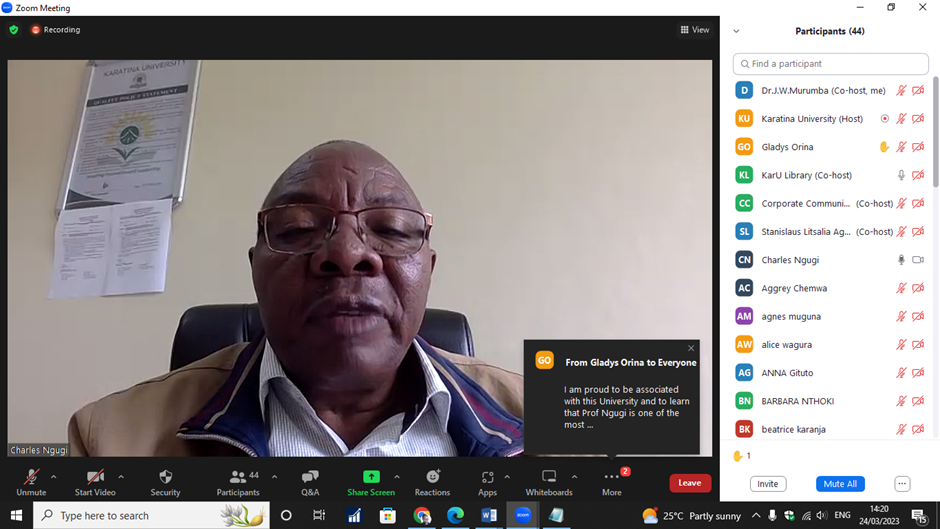
Prof. Charles Ngugi, Director, Postgraduate Studies giving his remarks
The Postgraduate Students Virtual Training held on Friday, 24th March 2023 was a great eye opener to the young researchers taking their studies at Karatina University. Organized by the Directorate of Postgraduate Studies in liaison with the University Library Services, the more than fifty postgraduate students were trained on citation and referencing using APA, on and off-campus access to e-resources, thesis formatting guidelines, plagiarism check, identifying credible journals when publishing and using tools such as ORCID and Google Scholar to make research impact.
Strengthen postgraduate training
The Deputy Vice Chancellor in charge of Academic, Research and Student Affairs, Prof. Peninah Aloo-Obudho lauded the organizers of the training citing that such sessions are critical for postgraduate students because they help sharpen their research skills. She further stated that the University had established a Committee to look into the research quality of postgraduate students and that based on the findings of the Committee, the University is keen to address any issues relating to postgraduate training.
In remarks read by the DVC (ARSA), the Vice Chancellor, Prof. Mucai Muchiri noted that the world-over, the image of any university is pegged on the output of its students in terms of research, innovations and publications. He, however, noted that there is concern on the quality of university research due to commercialization of thesis writing and publishing in predatory journals. These practices affect the quality of postgraduate education in our institutions.
“To mitigate this, we need to be deliberate on postgraduate research activities and put measures in place to curb the menace. We also need to curb plagiarism in academic research and other scholarly work. I, therefore, challenge all the academic Schools to focus on strengthening postgraduate training and research.”
Identifying credible journals
The Deputy University Librarian, Dr. Everlyn Anduvare, cautioned the students to be wary of publishing in predatory journals. While presenting on how to identify credible journals, she stated that digital publishing has opened up avenues for any individual(s) to pose as a publisher(s) creating a challenge in determining journals to publish in.
“Technology has opened up significant opportunities in publishing while, at the same time, it has caused disruptions. Opportunities such as open access to publishing have enabled a shorter publishing process via technologies with reduced need for intermediaries.”
Predatory journals are characterized by their existence for the sole purpose of making profits while prioritizing self-interest, minimum or no attention to quality research output and furthering of knowledge, thus, low academic standards, charging Article Processing Charges (APCs) that far outweigh the services offered, lack of rigorous peer review process despite claiming to provide the service, using aggressive and indiscriminate solicitation practices, for example, flattery and persuasive email invitations, lack of a focused scope, for example, willing to publish in as many areas as possible/available and revisions may not be required, instant publication is guaranteed.
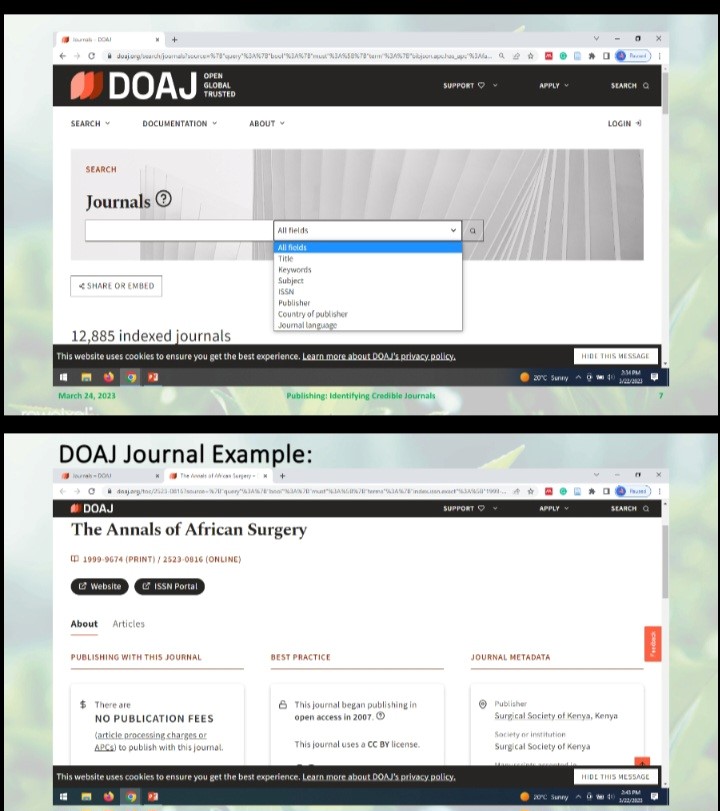
Source: Courtesy
There are several ways of identifying predatory and/or credible journals. The Beall’s List (https://beallslist.net/) contains an archived list of potential predatory journals and publishers and tips and advice on how to investigate journals and publishers before publishing. Also, the Directory of Open Access Journals (DOAJ) (https://doaj.org/) is a global indexing service that indexes diverse open-access journals from around the globe. A researcher can check if the journal they wish to publish in is listed on DOAJ.
In addition, the Think. Check. Submit. campaign to helps researchers identify trusted journals for their research. It is a simple checklist researchers can use to assess the credentials of a journal or publisher. It contains a checklist for books and journals that helps one discover what they need to know when assessing whether to publish or not. One is able to download the checklists for self-assessment or fill online and get results.
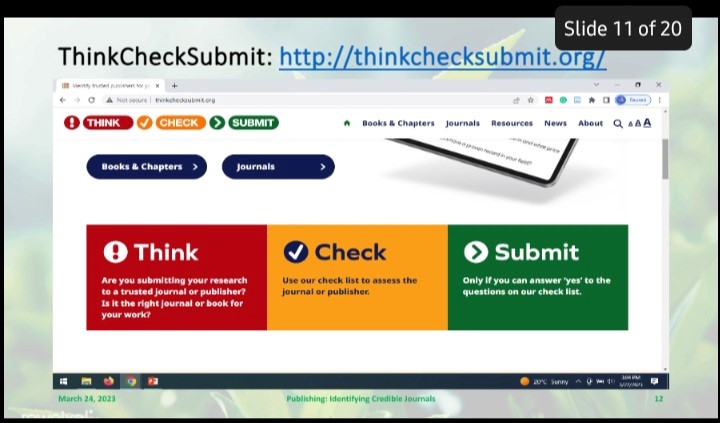
Source: Courtesy
There are other journal finders or suggesters which are tools that help potential authors to search for journals, particularly in subscription databases. Some of these are Scopus Journal Analyzer, Elsevier Journal Finder, Springer Journal Suggester, Manuscript matcher, IEEE Publication Recommender, Wiley Journal Finder among others.
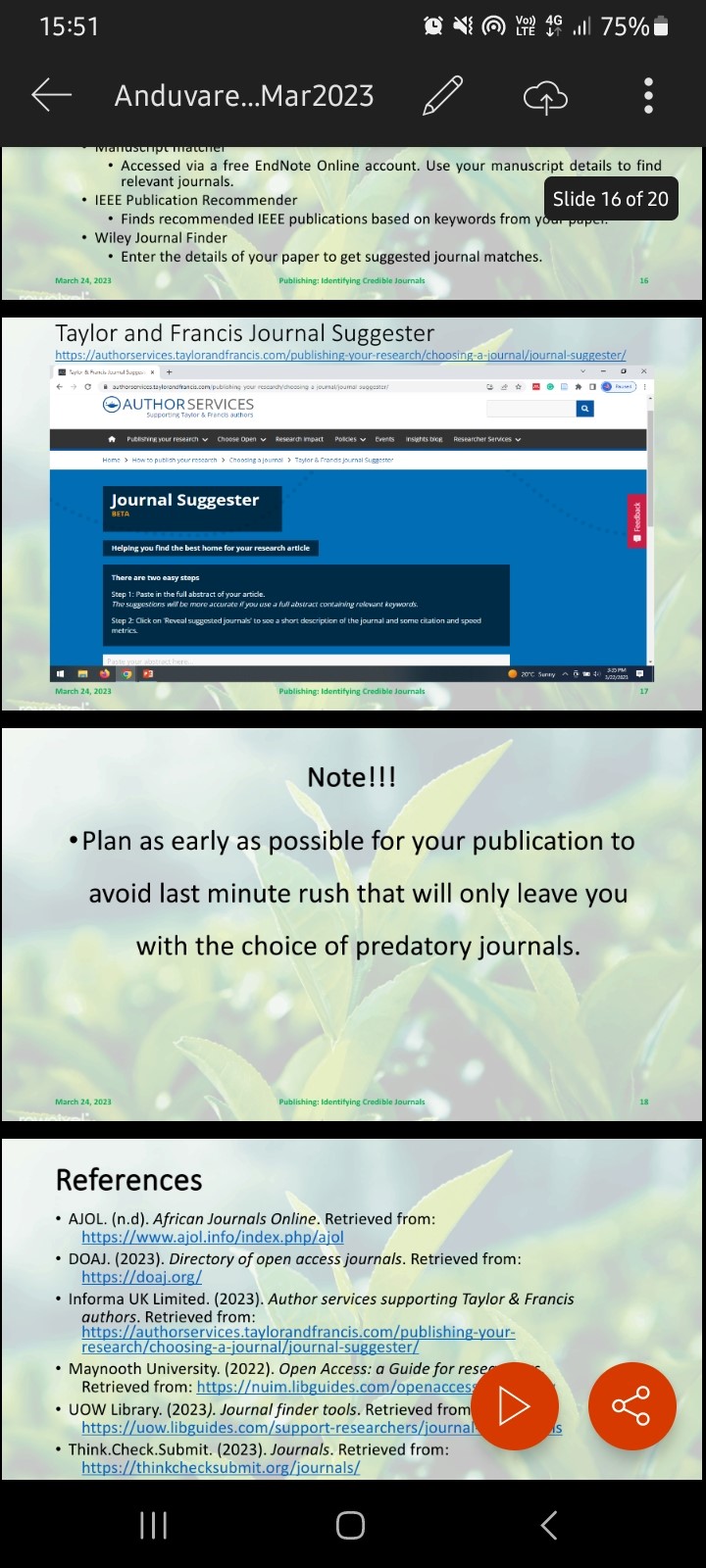
Source: Courtesy
7th APA referencing edition
The Director, ODeL, Dr. Joan Wakasa Murumba, made an in-depth presentation on ‘Citation and Referencing’. The students were taken through referencing, citation, in-text citations types and rules, general rules of writing a reference list and the different sources of information, referencing styles and the need for referencing, how to cite Tables, Figures and Appendices among others.
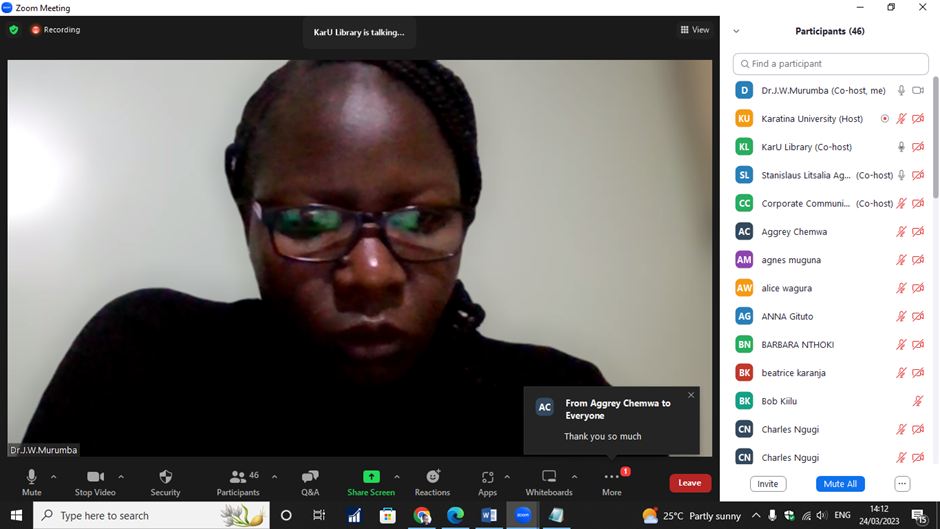
Dr. J.W. Murumba, Director, ODeL
Dr. Murumba also took the students through the main changes that have been made between APA Edition 6 and Edition 7. In APA Edition 7, the location of the publisher, for example, Nairobi, Kenya is no longer required. In addition, ‘Et al.’ is used from the word go where there are three or more authors. Surnames and initials up to twenty authors are also included in the reference list. This is in contrast with the 6th edition where the maximum was seven authors. There is also use of ellipsis (…) after the 19th author then the final author. In the 7th edition, document identifiers are formatted in the same way as uniform resource locator URLs while words such as “retrieved from” for URLs are no longer being used. Website names are included and web page titles italicized. This edition also requires that the blue font or plain text should not be underlined. This should be applied consistently. The links should be live where the work is to be published or read online. Both tables and figures are labelled from the above/top.
Why develop digital research footprints?
Mr. Agava Stanislaus Litsalia, the University Librarian at the National Intelligence and Research University College (NIRUC) made a presentation on how to build an online presence by creating and using Open Researcher and Contributor ID (ORCID)and Google Scholar Profiles.
“In today’s digital age, it has become more and more essential for academics to extend their career into the digital world.

Source: Courtesy
Open Researcher and Contributor ID (ORCID) is a persistent digital identifier that distinguishes researchers and their works and ensures that their research activities are accurately and easily attributed. It helps researchers in numerous ways such as distinguishing a researchers from others with similar names, ensuring that their research is correctly linked to them across different systems and institutions, and improving the discoverability and visibility of their work.
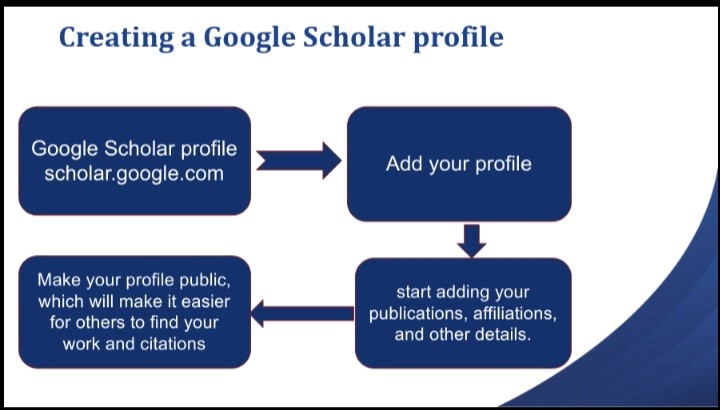
Source: Courtesy
Google Scholar, on the other hand, is a freely accessible search engine that indexes scholarly literature, including articles, theses, books, conference proceedings, and preprints, among others. Google Scholar profiles allow researchers to create a personal profile that showcases their research output, citation metrics, and collaboration networks. It can also help researchers to increase the visibility and impact of their work, as well as track the citations of their publications.
According to Mr. Agava, ORCID and Google Scholar profiles are useful tools that can help researchers to establish their identity, increase the visibility and impact of their work, and track their scholarly productivity. Therefore, researchers are encouraged to create and maintain these profiles to enhance their scholarly reputation and advance their research careers.
On and off-campus access to e-resources
The Senior Librarian, Mr. Vincent Bob Kiilu, made a detailed presentation on ‘on and off-campus access to e-resources’. E-resources refer to information resources in electronic format such as websites, e-journals, e-books as well as online and offline databases, for example, audio and video recordings. There two popular formats for e-books and e-journals availability are: Epub and PDF. These e-resources are accessible using electronic devices such as desktops, laptops, think pads, tablets and smartphones.
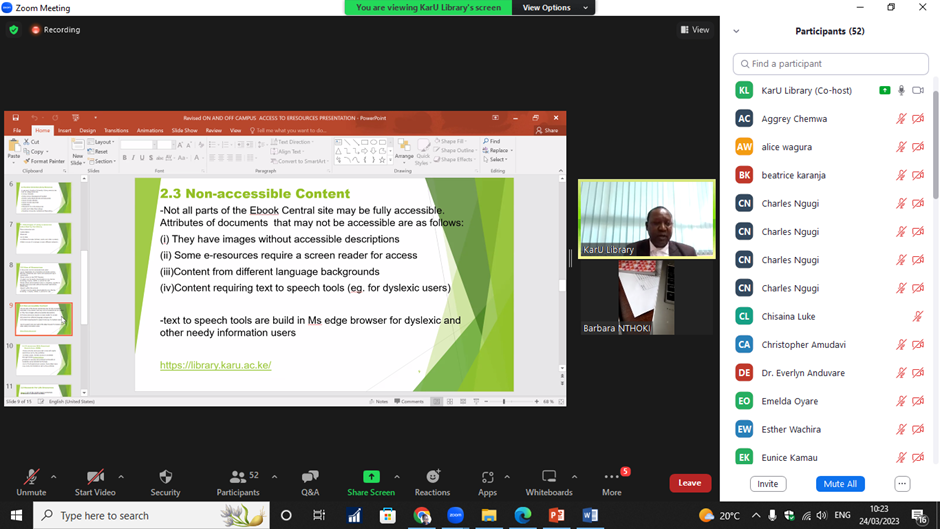
Mr. V. B. Kiilu, Senior Librarian giving his presentation
“Karatina University Library hosts millions of e-books and e-journals from credible publishers through subscription to KLISCs e-resources. These e-resources may be categorized into; Library Website, Koha Library Management System, KLISC subscribed e-books and e-journals, Open Access eBooks, Open Access e-journals, Databases, Research For Life e-resources, Audio and Video Recordings and the Institutional Repository.”
Using e-resources subscribed by the Library has its own advantages in that they are authoritative, relevant, up-to date, in different formats (full-text, audio and video content) and have a wide scope of coverage. E-resources can be accessed and used upon registration as a Karatina University Library Member (obtaining user name and password log in credentials), reading online (in the PDF Reader), downloading content to any device, including a laptop, tablet, or phone for use, reading offline (downloaded books or chapters): applies to e-books and e-journals without download restrictions (DRM-free) or searching within the e-book.
Plagiarism Check
The Senior Assistant Librarian, Mr. George Wamahiga, spoke on Plagiarism Check and Thesis Formatting Guidelines. Mr. Wamahiga stated that, currently, the University has subscribed to Ouriginal by Turnitin plagiarism software. This software is open to both staff and students to run their works before they send them for assessment to the library@karu.ac.ke.

Source: Courtesy
The recommended stages to check plagiarism are at the Proposal and Thesis stages of research. Here, the similarity level index of the student research should not exceed 15%. The University Librarian can check and provide a report to the Dean of the School and to the Board of Postgraduate Studies on the similarity levels index.
He further took the students through Karatina University Thesis formatting guidelines foregrounding what they should adhere to in terms of typing of thesis, margins and pagination, formatting, references, appendices among others.









